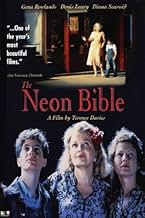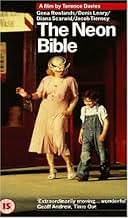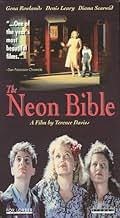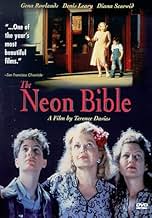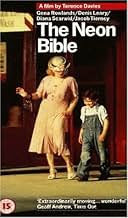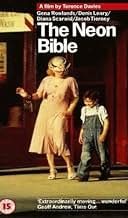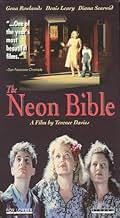Aggiungi una trama nella tua linguaWhile on a train, a teenage boy thinks about his life and the flamboyant aunt whose friendship acted as an emotional shield from his troubled family. This film evokes the haunting quality of... Leggi tuttoWhile on a train, a teenage boy thinks about his life and the flamboyant aunt whose friendship acted as an emotional shield from his troubled family. This film evokes the haunting quality of memory while creating a heartfelt portrait of a boy's life in a rural 1940s Southern town... Leggi tuttoWhile on a train, a teenage boy thinks about his life and the flamboyant aunt whose friendship acted as an emotional shield from his troubled family. This film evokes the haunting quality of memory while creating a heartfelt portrait of a boy's life in a rural 1940s Southern town.
- Regia
- Sceneggiatura
- Star
- Premi
- 1 vittoria e 2 candidature totali
Recensioni in evidenza
It is dreamy, corny, beautifully set-staged, almost, but its subject matter isn't. It traipses along as if in a trance, we are either taken in by its beauty or it just passes by, languidly, slowly, and yes, boringly.
I can't remember if anyone swore. There was blood, otherwise what happened? People sang quite a lot, embarrassingly, at times, otherwise one contrived scene floated into the next. True, I've not read the book, so cannot compare.
I think it could work if perhaps if it was written by Harold Pinter and directed like a Dennis Potter - jet black, violent and maybe then, memorable.
As it is, it's soppy, attempting to be different, where being different is like being different in the school playground; it looks odd, that oddness showing up over any potential good and thus making the film simply not work.
But after reading his fabulous Sight and Sound list choices, I decided to try another film of his once again -- in a more obscurer note, the Neon Bible. Adapted from the writer of the Confederates of Dunces, it tells the story of a troubled child in Nowhere, USA as he try to navigate his complicated family life, whilst intertwined with the South. Once her loving aunt decides to leave after a better opportunity arises, he reaches a rough decision that would change his life forever.
I was really shocked how much I love this film. It is just awe-inducing how well stylized it was and how the story just felt right even its much maligned fever pitch of a climax. I do not know, something about that climax worked for me. Its a clearly heightened depiction of growing up but I love how bizarre it was. It heightened the emotions of the film, which by then was pretty much subdued for most of the film. It also is an effective Americana (even though Davies is British) that works for its unabashed bluntness of how it depicts the South, grits and all.
Overall, a great film. [5/5]
The movie has an odd filming style that didn't make it feel like a movie from 1995, instead it felt like it had been filmed in the 60s or 70s. Long, awkward shots, sets that were very clearly sets. I think the director was often going for something that felt ethereal and nearly dreamlike, which I guess makes sense since the movie is told as a memory. I didn't like the style of the movie at all but I'm sure there are some people out there who would enjoy it just because it isn't your standard film experience.
The main character is such a vacuum of personality. I only saw this a day or two ago and I can remember next to nothing about him. He's a soft child, deliberately so, so much so I was waiting for a reveal that he was gay but at least at the part of the movie I got to, that hadn't happened. It just seemed to fit with the rest of the narrative covering religious con-men, racism and the general sexism of the 1930s-50s in the deep south.
The father was a non-character for how little screentime he had in it except to be a bully who very quickly was disposed off in quite and unceremonious way. The mother as well was very much a non-character, going from pretty bland to 'insane' seemingly at the drop of the hat when the father left the movie. I thought they were really going to hammer in the point that he was the main bread winner and now they were alone, but their living situation never seemed to change except the mother now awkwardly stared at the camera for minutes at a time singing.
The Aunt is the main driving force of the movie as the boy's only friend. A city woman apparently slumming it in the south once her mediocre career as a bar singer ended. It's weird how they display her though, early on she's hated by the father because she dresses 'slutty' to a party and humiliates them in front of the town, allegedly but then for the rest of the movie, no one ever brings that up again and everyone seems rather content with her being around and she seems to become quite a major part of the town of heavily religious people who go to rallies calling out women who sing in bands... which would be her specifically, but no one seems to acknowledge that. They do make the point that because of this 'low standing' she has in society, she is used by men, they don't respect her at all and use her for a bit of fun before dropping her.
I had a problem with timescales in this movie. The boy starts as a child and an amount of time passes before a transition where he suddenly is a teenager and then an amount of time passes before I gave up. The timescale is all over the place which means that the story crawls along at times and then suddenly speeds by. World War 2 is covered in the space of about 2 minutes which is crucial to several characters and probably covers months of time. The 'racism' element shown was a 5 second cut away of the boy being taken to a lynching by his father, and it seriously is gone in seconds. The sexism and religious fear is covered more in depth with a rally but even then the movie is so blunt and heavy handed they make sure to show the religious preacher standing there going "Hahahah, so many suckers, I am going to milk them for so much money, hahahahaha." before going into the sermon. So, WW2 which has massive implications on the entire family is covered with basically one voice over narration but the religious conman scene is a solid 10 minute rally that seemingly has no long lasting effect on the plot.
This isn't the usual type of movie I would go for but I like to try new things occasionally. This was just quite a disappointment. Most movies I drop before finishing get an automatic 1 but I felt bad doing it for this movie because there were some odd elements in it that kept me vaguely interested since I had been originally thinking of dropping it 30 minutes in but the religious conman scene kept my interest for about another 20 or so minutes.
But this is horrifically off the mark.
The review of Davies' version of Edith Wharton's *House of Mirth* in the NY Times said that the movie was more like Charles Dickens than Edith Wharton. Which is exactly the criticism I had of this movie. These folks are not embodying American Southern farmers, they're acting like industrial working class people. I can understand and be sympathetic to the original story: my people, coming from South Carolina & Georgia, had lives very similar to the plot of this movie. Therefore, I could see where this could potentially be a very good film.
But nothing gets under my skin like an inability to see beyond one's own cultural bias...which is the major mistake of the director of this production. If you take the emotions, the gestures, the imagery of this film and put them in an industrial landscape, it would be an OK movie. But having people interact and react this way and have them being farmers in the Deep South is bogus, phony and w-a-y off the mark. If you want to see true southern Americana, skip this movie and see Elia Kazan's *Wild River* instead...
The resulting film is disjointed, episodic and because of how internalized David is the plotting is hard to fully grasp. I am not sure if the plot is understandable if you *haven't* read the book. The material is about the oppressive nature of small town life for different people-especially fire and brimstone religion-builds up anger and resentment that comes out in violence. That comes across in the film if you know you are looking for it. If you not I think much of the film will be esoteric.
I ultimately ended up liking the film on the level of the companion to the novel. It helps a lot that I rather like the book and there's not much different in the works. The cinematic qualities are fairly good-if a little TV production. The melancholy of the novel comes through loud and clear.
Overall I am glad this film exists but it could have been better.
Lo sapevi?
- QuizIn an interview with "Time Out Film", Terence Davies said about this film, "[It] doesn't work, and that's entirely my fault. The only thing I can say is that it's a transition work. And I couldn't have done La casa della gioia (2000) without it."
- Citazioni
David, aged 15: If you were different from anybody else in town, you had to get out. They used to say in school, "you have to think for yourself," but you couldn't do that in town. You have to think what your father thought and that was what everybody thought.
- ConnessioniFeatured in Fandor: Cannes You Dig It? | Fandor Spotlight (2022)
- Colonne sonoreOh Lord, How Long?
Traditional
I più visti
- How long is The Neon Bible?Powered by Alexa
Dettagli
Botteghino
- Lordo Stati Uniti e Canada
- 78.072 USD
- Fine settimana di apertura Stati Uniti e Canada
- 5045 USD
- 3 mar 1996
- Lordo in tutto il mondo
- 78.072 USD
- Tempo di esecuzione
- 1h 31min(91 min)
- Colore
- Mix di suoni
- Proporzioni
- 2.35 : 1

